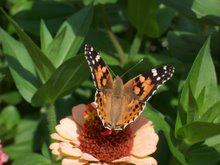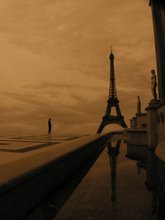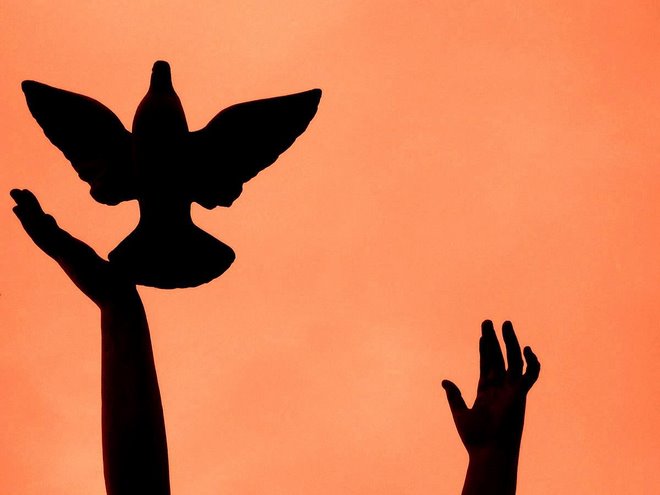I’ve been thinking a lot about my goals lately, which is never a bad idea. I left Prague to expand my horizons, but not only in a physical and abstract sense (since in the case of some travel these two can go hand-in-hand), but in a tangible comprehension of the most intangible of questions: “What is man?” “How does the world work” “What does it all mean?” I’d watched myself often slide into comfortable armchair explanations of the Problem of Pain, the Meaning of Life, and the Insanity of Humanity, but I knew I had no grounds to speak for and of people on whose ground I had never stood. The only solution (discounting the option of not talking about things I knew nothing about), was to go and see and find out.
The “going and seeing” part is no great burden in this day and age. While every new place seems to be teetering on the distant edge of the world in the eyes of those who have never been there, once you arrive the welcome party consists of a thousand people who have made the same journey, done the same things, and are already setting out for another not-quite-distant edge of the map.
The “finding out” is the true rub. The mantra of the foreign community in Japan says that after a week in Japan, you’re prepared to write a book on the subject, after a month you can get through a few paragraphs of hard facts, and after a year you find that there aren’t two words you can say that hold together. It’s that kind of place.
All in all, in setting out in a grand pursuit to understand the depth and breadth and true power of culture in the world today, I’ve landed in the Goliath of cultural understanding. Every world traveler I’ve spoken to or read in recent months has unhesitatingly named Japan as the most alien, most other-worldly place one can find. Every new experience and piece of information neatly punctures the ballooning theory thus far inflated, and no sooner is the new element incorporated and the theory puffed up again then the next missile-like encounter appears. The Japanese are very private. The Japanese are very friendly. The Japanese are very tolerant. The Japanese are very nationalistic. The country is very advanced. The country is very backwards. They want to be like America. They don’t want to be like anyone but themselves. They are very cultured. They are completely out of touch with their culture. They are extremely homogenous, but then how to explain such a diversity of contradictions? They are completely different from westerners. In what way? In no way. After 6 months here the only hard, undeniable foundation of fact I’ve been able to lay down is that the Japanese like rice, and they follow the rules. Anything else feels like nailing jell-o to a tree.
And so I put aside my goals of brotherly, multicultural, interracial, bridge-building, human-to-human understanding for a few months and focused on keeping my head above the rising sea of my own assumptions. Now, being half way through my time in Japan, I’ve started to realize the urgency of my situation. In no ways do I want to drift through, check off another country, snap some pictures, add some stories to my repertoire and move on. I want answers. I want to know the distance between “everywhere you go, people are people” and “I felt like I was on a different planet!” What does make us all one species? What makes us stare at each other in shock? On a planet of 6 billion separate worlds that are all shifting, mixing, absorbing, and clashing at a rate never seen in all history, how then ought we to live?
Some thoughts are beginning to surface, less absolutes than a categorization of what is not absolute, but perhaps those are the lines that must be drawn in before the painting can begin. Meanwhile, I’m finally trying to map out the big picture again. After July I hope to spend two months going through Vietnam and Cambodia, possibly Thailand, Malaysia and Burma, on the way to India. I still want to spend six months in India, though the details are still elusive.
Just before I came to Japan I chose a phrase to guide my search for answers, that being: “How do we live, how do we want to live, and how ought we to live?” Getting at the answers has been touch-and-go, but at least it grants some sensitivity to my internal “significant statement” alarm. My new brainchild, as yet uninitiated, is to ask two questions of everyone possible, especially as I travel through some of the most affluent and deprived countries in the world: “What one thing would you most like changed in your life?” and “What do you think could make that happen?” I hope to record these answers and start piecing together some understanding of humanity’s values, hopes, dreams, and perceptions of the world.
To backtrack for one final point; as headache-inducing as Japan has been philosophically, I expect India to be the fuse in this two-year attempt to make my head explode. From the very beginning, India frightened me, and the more I learn, the more I adjust to Japan, the more I learn about my own flaws and sensitivities, the more I wish I could find an excuse to avoid India altogether. But I know that my growing trepidation is the very proof that India is exactly where I have to go. Still, it is never easy to face something that you know, with absolute certainty, will change you forever in a completely unpredictable way. I learned long ago that “what doesn’t kill you makes you stronger” is completely ridiculous. There are so many other results of not dying.
The greatest instigator in my increasing concern is an increasing understanding of the difference between Japan and India. One thing is certain, while a year ago I might have been even more wet behind the ears than I am now, I sure knew how to pick countries! If the goal is to dive into the great worlds of culture, each as different from each other as they are from the west, I don’t know how I could have done it better. The shock, the pure, invasive, staggering shock, is going to be phenomenal. I can only hope that a few months in neighboring countries might dampen the blow, but I still fully expect to be crushed. But then that, after all, is the point. It’s a broken world, how can I touch it without being broken by it?
I’ve recently become enamored with a new author, Pico Iyer, a travel writer of great perception, energy, and an unmatched way of capturing the spirit of a place with words. To understand what I have ahead of me, I’m going to let Pico paint a picture of the two places he knows well. The first passage might be difficult to really grasp for anyone not familiar with Japan, but in all its mysterious references, quiet strength, and longing for something just beyond the shadows, this passage IS Japan for me:
The people all around me on this shiny autumn morning, refulgent and cloudless – though the trees are beginning to turn, and today, for the very first time, we put on thicker sweaters – are the very old, the very young; the others are off tending the fires of official Japan. I walk across the path in midmorning, and see old ladies walking with canes, out to get exercise as the leaves come down, or, as often, with tiny creatures by their sides, pointing out to them the cosmos flowers, that dog in winter coat. The very old and the very young live on the edge of things – though they’re central in Japan – and are closer to the woods; they don’t have to go and check in on the daylight world. They can talk, or make up stories, about creatures still known as kamisama here, or nature’s gods.
The grandparents weren’t such good parents themselves, perhaps, when they were young; but nature is affording them a second chance. They have time now – in the short term – and freedom, while it lasts, to pass on whatever their grandparents passed on to them. To tell the toddlers at their side that the fox who waits at the edge of the trees isn’t really a fox at all; to say that that stranger who sits in the frame on the shrine isn’t a stranger at all, but their grandmother’s grandmother. The children, lost in their own games, don’t bother to say that there isn’t a picture of any old woman on the shrine at home, and they know the foxes they see on TV aren’t real. That’s what makes them special.
They listen, because that’s what they’re supposed to do; perhaps they nod. And, being natural lawbreakers, they tell their grandparents a thing or two, about what that animal is saying to its owner, and what the secret name of that tree is. Their fathers are seldom visible, and their mothers are chafing against the uncertainties of a world of 7-Elevens and feudal rites; but the deer, the badgers stay the same.
(Sun After Dark, Vintage Departures, New York, 2004, pg 146-7).
That, at least in essence and atmosphere, is the world I’ve inhabited for the last half year, and will become more comfortable in the next half year. Now, compare that to the spirit of my next destination, the next place I will try to get my head around and somehow understand how it inhabits the same world as Japan, as California, as Prague, to somehow capture the “human element” in it all that can make strangers friends and foreigners brothers.
Movies were everywhere in India. But then everything was superabundant in India: signs, shrines, spices, smells, men, gods, beggars, cows, sobs, titters, marvels, horrors and more marvels. India itself seemed all perpetual motion and emotion, an overfull, overbright, overdone triptych by Hieronymus Bosch. Here was life, not on the grand, but on the epic scale, the Human Comedy, the Human Tragedy, played out on streets filled with too many people, too many feelings, too many schemes. India itself was simply too much.
The country’s recent history alone was something of a tumultuous spectacle, piled higher with incident and thicker with Tragedy, Comedy, Melodrama – proliferate plotting and non-stop action – than any movie on earth. In the few months before I arrived in India, its longtime, risen-and-fallen-and-rerisen Prime Minister had sent her army to storm a sacred golden shrine, and then had been killed by her own bodyguards. Her son, who had never before held office, became Prime Minister. Riots swept through the capital; men were burned alive, whole settlements were put to the torch, trains rolled through the countryside piled high with bloody bodies. Five weeks later, a cloud of poison gas had escaped from a chemical plant, killing thousands as they slept, in the worst industrial accident in history. Three weeks after that, the world’s largest democracy had held a national election. A typhoon in neighboring Bangladesh had killed as many as 20,000 people and swept whole islands into the sea. An Air-India plane had suddenly, inexplicably, fallen from the heavens, and 329 people had been killed, in one of the worst airline disasters ever recorded. A peace agreement between the Hindus and Sikhs had been reached at last, following which the moderate leader of the Sikhs was promptly assassinated by his followers. Meanwhile, civil war continued in Sri Lanka, there was more unrest in Assam and each day brought news of another politician gunned down by turban terrorists.
Yet this constant explosion of eventfulness was, if anything, even more unrelenting on the small scale. For the sights of India are, to a large extent, the streets themselves, and the streets are chaotic open-air stages presenting life in the raw and humanity in the round. Through the avenues of Bombay stream sadhus and shamans, bullocks carts and cows, rickshaws, rusty Ambassadors, turbaned men and veiled women, three-legged dogs, two-toed beggars, buses and bicycles and rites and sights and more people, more soldiers, more cows. Bleeding into this pandemonium is the confusion of the temples – not, as a rule, havens of meditation and quiet, but the Indian compendium all over again, a bombardment of sights and sounds and smells, monkeys, flames, chants, offerings, holy men, pilgrims, wonder-workers, musicians, more rites, more sights, more people. The streets of India are swollen with an embarrassment of riches, a richness of embarrassments. And it is on the streets that millions live, make love, defecate, and die.
(Video Night in Kathmandu, Vintage Departures, New York, 1988, pg 258-9)
As someone who has said, with full acknowledgement of all its implications, that “to ignore the ugly truths of reality is a slippery slope to perpetuating them”, how can I slip by a place such as this, crossing over to the other side of the street and tip-toeing by? At the whiff of real challenge and real failure, how can my chest not swell and my back tingle? How can I not be terrified? And while the world is certainly not getting any easier, or friendlier, or more loving, neither, it seems, am I. Though my mission to change the world has somehow morphed into a desperation to change myself, the two might not be so very different after all.
Another well worn phrase comes to mind: “You ain’t seen nothin’ yet!”
Welcome to the Penguin's world! Come in and Discover!
Hello friends! I hope you enjoy looking around my blog. I'm planning to keep it updated with pictures, stories, and news of my latest experiences... but since I'm not having too many extreme adventures lately, I'll keep you informed regarding what I'm learning. Very interesting stuff! At least, I think so. I've realized more and more how huge the world is (I know, cliché, but REALLY!), how much cool stuff there is to discover, and what a waste it would be if I just sat back and lived out my life. This blog is an attempt to keep my eyes open, and I hope it will inspire everyone who reads it to do the same. Each week I'll post a list of seven things I discovered about the world that week, and you can check them out on the right in the "Discover Something New" section, or just scroll down to see the most recent one. I hope you find them as fascinating as I do!
As for the Penguins, well, if you don't know what that's about, then I probably don't know you well enough for you to be on my blog! Scat!
For everyone else, Quack Quack, and enjoy. :-)
-Caleb
Saturday, January 31, 2009
Subscribe to:
Post Comments (Atom)



2 comments:
Very interesting......
With the boredom and "useless" factor, you could almost be at Ft Benning with a brokn hip!
So off to India....
:-)
CQ
Wow! Great writing Caleb, not to mention Pico! I have the "Video" book and another one of his to read.
I may not be glad I read it though if it gives me anymore blatant descriptions of life in India and how I know it will affect you.
Mom
Post a Comment